by Liz Liener | Feb 2, 2017 | Voices From the Board |
Today, Dallas boasts six Jewish day schools. How did a city in the Southwest, one that could not keep even one Kosher restaurant in business in the 1970s, get to a point that it could accommodate and maintain so many Jewish schools? Actually, the seeds for Dallas’ diverse and growing Jewish community that supports these schools were planted more than 50 years ago by a man named Marcus Rosenberg.
Growing up in the idyllic town of Bardejov, Czechoslovakia, before World War II, Marcus’ rights and freedoms as a Jew were protected by a democratic government. However, when the fascist Hlinka party gained control of the country in 1939, the situation took a dire turn. Sympathetic to the Third Reich, the new government instituted a vast number of Nazi-like, anti-Jewish laws and began deporting its Jewish citizens “to the east.”
The Rosenberg family was torn apart by war, deportations and horrific experiences in the Nazi death camps. Miraculously, Marcus and three of his siblings survived, returning to Bardejov to rebuild their lives. Within a few years, the country was again taken over, this time by Communists – and the Rosenbergs escaped to the United States.
Marcus found his way to Dallas to reunite with family members in the area, and in his new life here, he emerged as a dynamic, unstoppable businessman and influential philanthropist who greatly enriched Jewish life in the city. It was in Dallas that Marcus established the first sustainable Jewish day school, Akiba Academy of Dallas.
When Marcus came out of Auschwitz, he struggled with serious questions about God. Although he was always profoundly silent about that period of his life, the effects of the war greatly impacted his personal theology. Yet, he loved being Jewish, and when the opportunity presented itself, he became fully committed to doing what he could to give children a strong Jewish education and identity. The best way for Marcus to dull the hurt in his heart was to give back to others, and in large part, he did this by obligating himself to the next generation.
From the establishment of Akiba Academy in 1962, the concept of educating Jewish children in a day school environment took hold, and other day schools were gradually established in the area, reflecting various Jewish denominations and the continual growth of the community.
For more information about the life of Marcus Rosenberg, his memoir, Markus, Planter of Trees, is available in the library of the Dallas Jewish Historical Society and in the Tycher Library at the J.
by DJHS Admin | Jul 7, 2015 | Video Oral History |
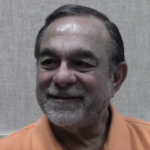 Jaime Hazan-Cohen was born in Havana, Cuba, and moved to the U.S. in October of 1960. He initially lived in Florida and then relocated to Dallas. Jaime’s father was born in Beirut, Lebanon, and his mother was born in Cuba. Jaime went to law school in Havana, then to Southern Methodist University in Texas and following that worked as an accountant. He later opened a wholesale textile business with his brother and father. Jaime met his wife, Esther, in Dallas at the age of 30 and they married a year later. He is an active member of Congregation Tiferet Israel, has served on the boards of both Akiba Academy and Tiferet Israel, and has supported other community organizations alongside his wife.
Jaime Hazan-Cohen was born in Havana, Cuba, and moved to the U.S. in October of 1960. He initially lived in Florida and then relocated to Dallas. Jaime’s father was born in Beirut, Lebanon, and his mother was born in Cuba. Jaime went to law school in Havana, then to Southern Methodist University in Texas and following that worked as an accountant. He later opened a wholesale textile business with his brother and father. Jaime met his wife, Esther, in Dallas at the age of 30 and they married a year later. He is an active member of Congregation Tiferet Israel, has served on the boards of both Akiba Academy and Tiferet Israel, and has supported other community organizations alongside his wife.
To watch the video, click here.
by Bryan Cytron | Apr 29, 2015 | 1950s, Video Oral History |
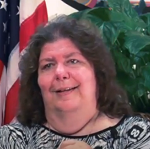 Esther Hazan-Cohen was born in 1950 in El Paso, Texas. Her mother was born in Mexico City and her father, raised in Turkey, served in the military during World War II and was stationed in Hawaii. Her family moved to Albuquerque in 1952, then to Oklahoma, and finally settled in Dallas. She attended Thomas Jefferson High School, followed by two years at the University of North Texas before meeting her husband, Jaime. They were married in 1971 and settled back in Dallas in 1977. Esther sent her children to Akiba Academy and worked with the PTA there, later becoming president of the school for two years. Following her presidency at Akiba Academy, Esther began working with Jewish Family Service and helped establish the program called “Centerpieces for Tzedakah”. She has been heavily involved in B’nai Zion and Bnei Akiva, and also served on the Board of Directors at Congregation Tiferet Israel.
Esther Hazan-Cohen was born in 1950 in El Paso, Texas. Her mother was born in Mexico City and her father, raised in Turkey, served in the military during World War II and was stationed in Hawaii. Her family moved to Albuquerque in 1952, then to Oklahoma, and finally settled in Dallas. She attended Thomas Jefferson High School, followed by two years at the University of North Texas before meeting her husband, Jaime. They were married in 1971 and settled back in Dallas in 1977. Esther sent her children to Akiba Academy and worked with the PTA there, later becoming president of the school for two years. Following her presidency at Akiba Academy, Esther began working with Jewish Family Service and helped establish the program called “Centerpieces for Tzedakah”. She has been heavily involved in B’nai Zion and Bnei Akiva, and also served on the Board of Directors at Congregation Tiferet Israel.
To watch the video, click here.
by Bryan Cytron | Apr 29, 2015 | 1920s and Earlier, Video Oral History |
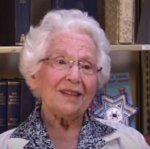 Ethel Gruen was born in 1920 in New York City. She attended Julia Richman High School in downtown New York, which was the first time she and her twin brother, Sam, had been separated. Afterwards she went to Hunter College and married her husband, Ronnie z”l, in 1942. They settled down in New York and Ronnie was exempt from army service because he was a tool and dye maker. Ethel and her husband have always been very important advocates of Jewish education, having supported the Dallas Jewish community and its institutions like Akiba and Yavneh Academies in addition to Yeshiva University in New York. Ronnie and Ethel were involved with the establishment and development of both Akiba Academy and Congregation Beth Torah and have served as major philanthropists in the Jewish community.
Ethel Gruen was born in 1920 in New York City. She attended Julia Richman High School in downtown New York, which was the first time she and her twin brother, Sam, had been separated. Afterwards she went to Hunter College and married her husband, Ronnie z”l, in 1942. They settled down in New York and Ronnie was exempt from army service because he was a tool and dye maker. Ethel and her husband have always been very important advocates of Jewish education, having supported the Dallas Jewish community and its institutions like Akiba and Yavneh Academies in addition to Yeshiva University in New York. Ronnie and Ethel were involved with the establishment and development of both Akiba Academy and Congregation Beth Torah and have served as major philanthropists in the Jewish community.
To watch the video, click here.
by Bryan Cytron | Apr 21, 2015 | 1940s, Video Oral History |
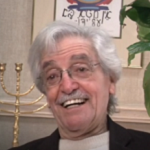 Eli Davidsohn, one of three children, was born in 1943 in La Paz, Bolivia, and was raised in Lima, Peru, where he lived until the age of eighteen. His parents ended up in Bolivia after having escaped Nazi Germany; his father became a mining engineer. Eli has played the accordion from the time he was a little boy, and has always loved leading services with his musical talents. Eli attended a Jewish day school in Bolivia, but shares that he experienced much anti-semitism in the country. He decided to move to America and ended up in Houston. Eli served in the U.S. Army, worked for General Dynamics in Fort Worth, and then married two months after the completion of his service. He is a proud father of four and grandfather of many, and continues to share his contagious energy and passion through his teaching and song-leading.
Eli Davidsohn, one of three children, was born in 1943 in La Paz, Bolivia, and was raised in Lima, Peru, where he lived until the age of eighteen. His parents ended up in Bolivia after having escaped Nazi Germany; his father became a mining engineer. Eli has played the accordion from the time he was a little boy, and has always loved leading services with his musical talents. Eli attended a Jewish day school in Bolivia, but shares that he experienced much anti-semitism in the country. He decided to move to America and ended up in Houston. Eli served in the U.S. Army, worked for General Dynamics in Fort Worth, and then married two months after the completion of his service. He is a proud father of four and grandfather of many, and continues to share his contagious energy and passion through his teaching and song-leading.
To watch the video, click here.
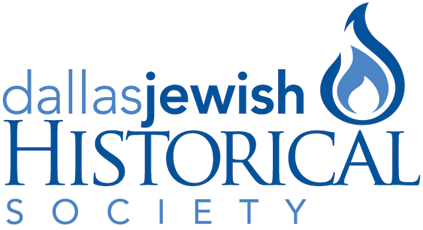
 Jaime Hazan-Cohen was born in Havana, Cuba, and moved to the U.S. in October of 1960. He initially lived in Florida and then relocated to Dallas. Jaime’s father was born in Beirut, Lebanon, and his mother was born in Cuba. Jaime went to law school in Havana, then to Southern Methodist University in Texas and following that worked as an accountant. He later opened a wholesale textile business with his brother and father. Jaime met his wife, Esther, in Dallas at the age of 30 and they married a year later. He is an active member of Congregation Tiferet Israel, has served on the boards of both Akiba Academy and Tiferet Israel, and has supported other community organizations alongside his wife.
Jaime Hazan-Cohen was born in Havana, Cuba, and moved to the U.S. in October of 1960. He initially lived in Florida and then relocated to Dallas. Jaime’s father was born in Beirut, Lebanon, and his mother was born in Cuba. Jaime went to law school in Havana, then to Southern Methodist University in Texas and following that worked as an accountant. He later opened a wholesale textile business with his brother and father. Jaime met his wife, Esther, in Dallas at the age of 30 and they married a year later. He is an active member of Congregation Tiferet Israel, has served on the boards of both Akiba Academy and Tiferet Israel, and has supported other community organizations alongside his wife. Esther Hazan-Cohen was born in 1950 in El Paso, Texas. Her mother was born in Mexico City and her father, raised in Turkey, served in the military during World War II and was stationed in Hawaii. Her family moved to Albuquerque in 1952, then to Oklahoma, and finally settled in Dallas. She attended Thomas Jefferson High School, followed by two years at the University of North Texas before meeting her husband, Jaime. They were married in 1971 and settled back in Dallas in 1977. Esther sent her children to Akiba Academy and worked with the PTA there, later becoming president of the school for two years. Following her presidency at Akiba Academy, Esther began working with Jewish Family Service and helped establish the program called “Centerpieces for Tzedakah”. She has been heavily involved in B’nai Zion and Bnei Akiva, and also served on the Board of Directors at Congregation Tiferet Israel.
Esther Hazan-Cohen was born in 1950 in El Paso, Texas. Her mother was born in Mexico City and her father, raised in Turkey, served in the military during World War II and was stationed in Hawaii. Her family moved to Albuquerque in 1952, then to Oklahoma, and finally settled in Dallas. She attended Thomas Jefferson High School, followed by two years at the University of North Texas before meeting her husband, Jaime. They were married in 1971 and settled back in Dallas in 1977. Esther sent her children to Akiba Academy and worked with the PTA there, later becoming president of the school for two years. Following her presidency at Akiba Academy, Esther began working with Jewish Family Service and helped establish the program called “Centerpieces for Tzedakah”. She has been heavily involved in B’nai Zion and Bnei Akiva, and also served on the Board of Directors at Congregation Tiferet Israel. Ethel Gruen was born in 1920 in New York City. She attended Julia Richman High School in downtown New York, which was the first time she and her twin brother, Sam, had been separated. Afterwards she went to Hunter College and married her husband, Ronnie z”l, in 1942. They settled down in New York and Ronnie was exempt from army service because he was a tool and dye maker. Ethel and her husband have always been very important advocates of Jewish education, having supported the Dallas Jewish community and its institutions like Akiba and Yavneh Academies in addition to Yeshiva University in New York. Ronnie and Ethel were involved with the establishment and development of both Akiba Academy and Congregation Beth Torah and have served as major philanthropists in the Jewish community.
Ethel Gruen was born in 1920 in New York City. She attended Julia Richman High School in downtown New York, which was the first time she and her twin brother, Sam, had been separated. Afterwards she went to Hunter College and married her husband, Ronnie z”l, in 1942. They settled down in New York and Ronnie was exempt from army service because he was a tool and dye maker. Ethel and her husband have always been very important advocates of Jewish education, having supported the Dallas Jewish community and its institutions like Akiba and Yavneh Academies in addition to Yeshiva University in New York. Ronnie and Ethel were involved with the establishment and development of both Akiba Academy and Congregation Beth Torah and have served as major philanthropists in the Jewish community. Eli Davidsohn, one of three children, was born in 1943 in La Paz, Bolivia, and was raised in Lima, Peru, where he lived until the age of eighteen. His parents ended up in Bolivia after having escaped Nazi Germany; his father became a mining engineer. Eli has played the accordion from the time he was a little boy, and has always loved leading services with his musical talents. Eli attended a Jewish day school in Bolivia, but shares that he experienced much anti-semitism in the country. He decided to move to America and ended up in Houston. Eli served in the U.S. Army, worked for General Dynamics in Fort Worth, and then married two months after the completion of his service. He is a proud father of four and grandfather of many, and continues to share his contagious energy and passion through his teaching and song-leading.
Eli Davidsohn, one of three children, was born in 1943 in La Paz, Bolivia, and was raised in Lima, Peru, where he lived until the age of eighteen. His parents ended up in Bolivia after having escaped Nazi Germany; his father became a mining engineer. Eli has played the accordion from the time he was a little boy, and has always loved leading services with his musical talents. Eli attended a Jewish day school in Bolivia, but shares that he experienced much anti-semitism in the country. He decided to move to America and ended up in Houston. Eli served in the U.S. Army, worked for General Dynamics in Fort Worth, and then married two months after the completion of his service. He is a proud father of four and grandfather of many, and continues to share his contagious energy and passion through his teaching and song-leading.
Recent Comments